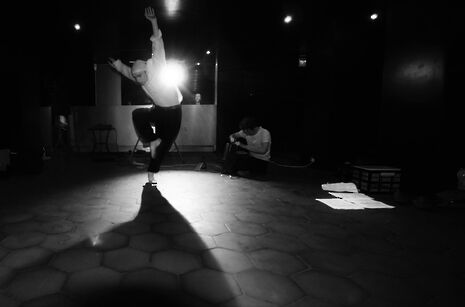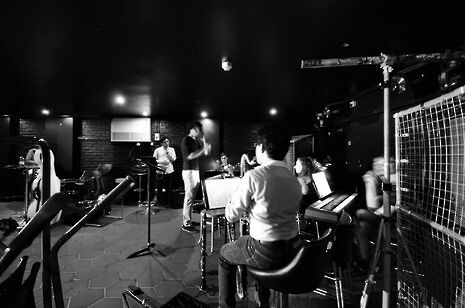Preview: Pierrot Lunaire
Radu Thomas attends a rehearsal for the upcoming production of Pierrot Lunaire

The Wolfson Party Room is very dark. It is underground, quite hard to find and, being a ‘party’ room, generally used for Trinity College bops. But, most of all, it is very dark. First used as a theatre space by directors Jake Thompson and Edith Franklin in their acclaimed production of Brecht’s The Good Soul of Szechuan, it still comes across as quite a stubborn space – reluctant to yield to any drastic modification, it remains a large black room. Unafraid, John’s gent and bon vivant William Ashford, previously director of Mozart’s The Marriage of Figaro and Stoppard’s The Real Inspector Hound, has brought together a group of students to perform Arnold Schönberg’s famous ‘melodrama’, Pierrot Lunaire, in the space. Amber Evans and Sam Fairbrother take up, respectively, the roles of singer and dancer with Roc Fargas Castells conducting the small ensemble of instruments.
The staging is pleasingly sparse and the production appears unburdened, possibly increased by the room not providing much but an open, sodium-lit floor. The musicians are against one side, a light at the other; Sam makes full use of the space between the two. He changes costumes and interacts with chairs, a hat-stand and Amber herself through the piece – the choreography is ambitious and arresting. Will has incorporated pre-recorded samples and live poetry into the performance – not just in English; he expresses a desire to explore the translational history of the text. Originally written in French and then translated into German and then into English, it possesses a “multiplicity of linguistic angles”.
Will complains of a headache but seems happy to see me. He darts back and forth across the room, clearly excited. At one point he asks Amber to sing a hundred times quieter for a few bars, specifying that Edith (who, at this point, reads a poem overlaying Amber’s vocal line) should speak 72 times louder. He is passionately precise, overseeing the rehearsal efficiently and amicably. At another choice moment, when asked what he would like from Sainsbury’s, he changes his initial request of water to a cider. It is during the resultant short break that I get to pick his brain. Failing to articulate any suitable questions, I ask him to ‘comment’ on the interpretative process; putting down his cider, he responds admirably well.
He is keen to emphasise the work’s versatility: “I think importantly the work is not just musical – although the orchestra under Roc’s guidance and Amber are, needless to say, fantastic. It really is a total theatrical work: the dancing is essential to the way I’ve staged this in creating narrative or a sort of drama, melodrama – 21 melodramas I suppose. Sam and I have worked a lot on the meaning of the text, not just in English, but in French and in German, to see where the narrative can go and we’ve made a narrative of that rather than doing something straightforward – it’s more abstract and the dance conveys that.”
He glides effortlessly through musical history, citing the influence that the “landmark work” has had on modern music – its immense “weight” that, as a music student, he has spent time studying. He makes an interesting remark from this vantage point: “it’s a very rarely performed work, and it’s a work which has been studied a lot in conservatoires and music degrees but, as I say, very rarely ever experienced as a total kind of work – not in a Wagnerian ‘Total Work’ way but as a performance that incorporates more than just the musical element. In fact, actually, it was commissioned by a performer, not a singer! It has a lot of the word ‘cabaret’ in it and that’s very rarely considered, for instance. It’s a necessity, especially in a university environment, to show that this piece is more than just a sterile intellectualised object and that it’s actually something highly theatrical.”

Some moments later, Roc comes outside to join us. He and Will agree that the piece is brilliant albeit difficult: “so complex!”, “extremely challenging!”, they continue smiling. Roc points out that whilst Schönberg might be famous for developments in tonality, particular difficulty lies in the rhythms. He explains that the process of making it quite literally “come together”, in the sense of there being multiple musicians playing very rhythmically different parts, was especially difficult. The drama of the work is touched on again by Roc; the orchestration, for him, presents particular interest: “one of the most interesting things about the piece is the variety of timbres and textures that Schönberg achieves with only five players – the combination of instruments is different in each of the movements, each has its own atmosphere.”
The two principles are both, next year, going onto further study in their fields: Amber in Manhattan and Sam in London. Both sing the praises of the piece itself; it is of course (at least in the author’s opinion) beautiful, but crucially it offers both practitioners a great deal of room for critical engagement. Sam, whose choreographic knowledge extends well beyond the point of my comprehension, is excited by the piece and is seeking to tackle it originally. Highlighting the prominent cabaret influence (something that Will corroborated), Sam explains some of the thought behind his choreography: “Well it sort of has its roots in cabaret as a piece, so we wanted something that incorporated that sense of virtuosity and how that might come together in something that moves away from how it has been done until now. There is a history of ballet and contemporary dance touching on that element, particularly Glen Tetley’s 1962 production which was predominantly a sort of contortion thing on scaffolding, it was thinking abstractedly to make ‘cabaret’ new.” There is no sense of aping: Sam wants to make something new now, as Glenn Tetley did then.
Amber, whose approaching time at the Manhattan School of Music will be spent predominantly on the 20th century vocal repertoire, lights up when asked about the piece and the project in general: “it’s a completely otherworldly experience. One of the greatest aspects of the work is being freed of the ivory cage that one normally is taught as a singer in the bel canto technique. It’s absolutely sensational. All I could wish for is that this project were for a few weeks as opposed to a few days but this has been a life-changing experience – my first Pierrot and I’ll never forget it.’
All in all, this looks to be potentially a real highlight in the run-up to May Week, especially as the show occupies a niche satisfyingly distant from people asking you to watch them row.
Pierrot Lunaire will have performances at 20:00 on Wednesday 8th June and 12:00 and 20:00 on Thursday 9th June in the Wolfson Party Room of Trinity College. Admission is free.
 Interviews / You don’t need to peak at Cambridge, says Robin Harding31 December 2025
Interviews / You don’t need to peak at Cambridge, says Robin Harding31 December 2025 News / Unions protest handling of redundancies at Epidemiology Unit30 December 2025
News / Unions protest handling of redundancies at Epidemiology Unit30 December 2025 Comment / What happened to men at Cambridge?31 December 2025
Comment / What happened to men at Cambridge?31 December 2025 Features / ‘Treated like we’re incompetent’: ents officers on college micromanagement30 December 2025
Features / ‘Treated like we’re incompetent’: ents officers on college micromanagement30 December 2025 Theatre / We should be filming ADC productions31 December 2025
Theatre / We should be filming ADC productions31 December 2025








